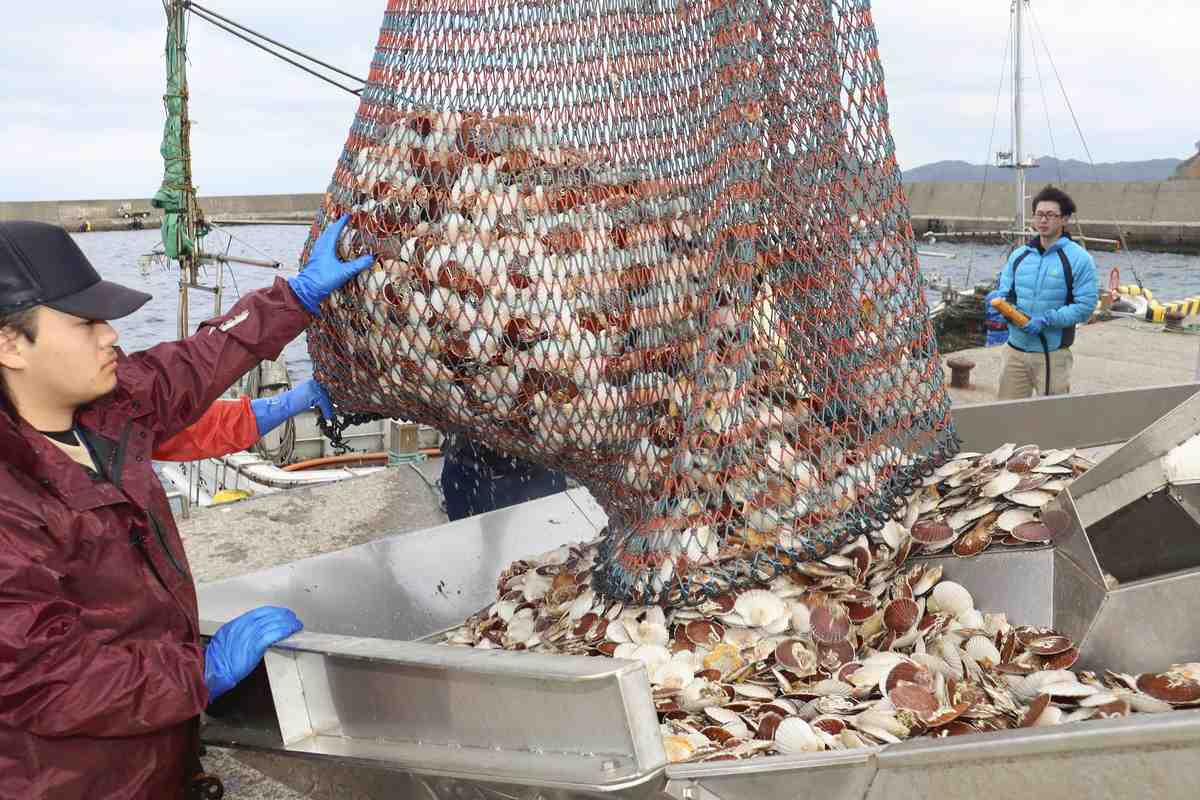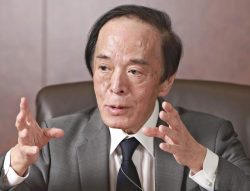Trump Tariffs Squeeze Some Japanese Food Exporters; Rice, Seafood Producers Fear Negative Impact

Scallops being landed are seen in Hiranai, Aomori Prefecture in May 2024.
16:25 JST, April 17, 2025
With U.S.-Japan trade negotiations beginning in earnest on Thursday, Japanese companies face increasing uncertainty regarding their export prospects, especially with some sectors already feeling the initial impact of the new U.S. tariff policies.
While they have seen significant growth in the U.S. market due to the popularity of Japanese cuisine and a weaker yen, the potential impact of the tariffs is a major concern, creating both anticipation and anxiety about the outcome of the talks.
Fenix Co., a frozen food manufacturer in Kitakyushu, has seen a sharp drop in wholesale orders for squid products exported to Japanese restaurants in the United States this month, with only one order received compared to the usual five or six on a monthly basis, it said. The company attributes the drop to customers holding off on purchases in anticipation of increased import costs due to the tariffs.
The company exports its products to the United States, South Korea and Australia, with the U.S. market accounting for 30% of its overseas sales.
The president of the frozen food company voiced his concerns about potential costs of freezing and storing raw materials, saying: “If this situation persists into next month, it will be a major blow. Given the significant U.S. role in these negotiations, we hope the Japanese government will stand firm and not be swayed.”
Eco-rice Niigata Co., a rice producer in Nagaoka, Niigata Prefecture, has applied to the government to export about 200 tons of last autumn’s harvest, 70% of which is bound for the United States. The company wants to export it during the 90-day temporary suspension of reciprocal tariffs, which ends in early July. However, it anticipates congestion at U.S. customs due to a surge in other exports, which may prevent its rice from being cleared by the deadline, it said.
Due to regulations, rice destined for export is usually not allowed to be sold domestically. Commenting on this restriction, President Yu Toyonaga, 61, said: “It is simply not feasible to export an entire year’s rice production in 90 days. We want these negotiations to at least secure an extension of the temporary suspension.”
In Aomori Prefecture, the nation’s second largest scallop-producing region after Hokkaido, many people are closely watching the progress of the trade talks. “We hope that the fisheries and agricultural sectors will not be unduly burdened by being used as bargaining chips for automobiles and other sectors,” said Harumi Niki, chairman of the prefecture’s federation of fisheries cooperative associations.
In 2023, Aomori Prefecture’s agricultural, forestry and fisheries product and food exports to the United States totaled about ¥900 million, with scallops accounting for more than 40% of that export value.
Scallops have been exempt from tariffs, but the imposition of reciprocal tariffs would significantly increase costs for American buyers. “If Hokkaido’s scallops destined for export to the United States are redirected within Japan, we could see a drop in the price of Aomori scallops,” Niki said.
Meanwhile, some companies are looking to diversify their sales channels beyond the United States. Tsutomu Foods, a konnyaku yam cake manufacturer and seller in Tomioka, Gunma Prefecture, already exports to 12 countries and regions, where it enjoys strong sales in Japanese supermarkets.
The company’s sales in the United States have experienced significant growth, rising from about ¥70,000 in fiscal 2020 to ¥40 million in fiscal 2023. Yet, this progress was directly affected by the high tariff policy.
To maintain consumer demand despite potential tariff-related price increases, the company plans to begin exporting konnyaku noodles. “We aim to differentiate our new offerings from our existing products and expand our sales channels to the Middle East and other regions,” said Kazumi Tsuchiya, 45, managing director.
Related Tags
Top Articles in Business
-

Prudential Life Insurance Plans to Fully Compensate for Damages Caused by Fraudulent Actions Without Waiting for Third-Party Committee Review
-

Narita Airport, Startup in Japan Demonstrate Machine to Compress Clothes for Tourists to Prevent People from Abandoning Suitcases
-

Japan, U.S. Name 3 Inaugural Investment Projects; Reached Agreement After Considerable Difficulty
-

Toyota Motor Group Firm to Sell Clean Energy Greenhouses for Strawberries
-

Japan’s Major Real Estate Firms Expanding Overseas Businesses to Secure Future Growth, Focusing on Europe, U.S., Asia
JN ACCESS RANKING
-

Producer Behind Pop Group XG Arrested for Cocaine Possession
-

Japan PM Takaichi’s Cabinet Resigns en Masse
-

Man Infected with Measles Reportedly Dined at Restaurant in Tokyo Station
-

Israeli Ambassador to Japan Speaks about Japan’s Role in the Reconstruction of Gaza
-

Videos Plagiarized, Reposted with False Subtitles Claiming ‘Ryukyu Belongs to China’; Anti-China False Information Also Posted in Japan





















